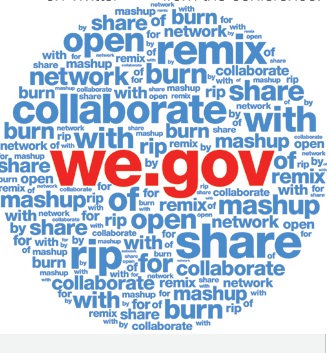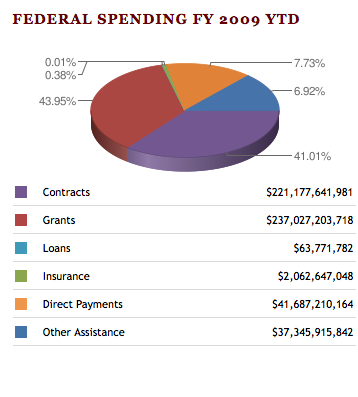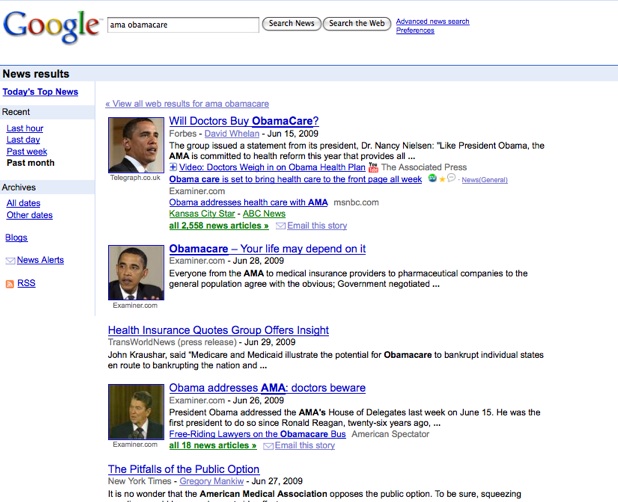
If information is power, the first step to gaining power is to get the right data. The Obama administration is a big proponent of opening up government data and making it digitally available. Today at the Personal Democracy Forum in New York City, the government’s new chief information officer Vivek Kundra announced USAspending.gov, a new site which launched today that tracks government spending with charts and lists ranking the largest government contractors (Lockheed, Boeing, Northrop Grumman, etc.) and assistance recipients (Department of Healthcare Services, New York State Dept. of Health, Texas Health & Human Services Commission, etc.). There is also the Data.gov project, which is attempting to digitize government data and make it available in its raw form for citizens and companies to sift through.
While Kundra agrees in principle that all public government data should be online, he also cautions that the reality is government data sits in more than 10,000 different systems, many of them written in COBOL or are still locked in dusty paper archives. But at least the government is starting to tackle the problem. The government collects a wealth of data, and the more accessible it becomes the more transparent government itself will be (not to mention the opportunities to startups which can tap into this data to offer new services). The State Department is also using the Internet, and Youtube specifically, to reach out directly to citizens of other countries every time Obama or Hillary Clinton travel abroad. They record video messages to citizens of other countries, which are distributed in multiple languages. Call it YouTube diplomacy.

In addition to releasing government data in digital form, the Obama administration is learning to listen to direct feedback from citizens through its Open Government initiative where people can suggest and vote on policy initiatives. These are then further refined and discussed on the Open Government blog and using tools such as wikis. Beth Noveck, the United States Deputy Chief Technology Officer for Open Government, says the administration has gone from using the Internet to broadcast and amplify its message during the campaign to the realization that it can get information back as well, which it is trying to fold back into policy. She says, “What we’ve seen is enormously thoughtful suggestions that no small group of people in the White House could have come up with themselves.”
Digital tools are bringing participation back to democracy, or at least that is the idea. But once all of this data becomes free and new modes of influencing government policy are deemed to be effective, attempts to manipulate the data and game the system will emerge. Well-funded lobbyists and special interests will descend on these nascent institutions of “open government” like SEO consultants on Google. People from both sides of the aisle will also participate. Todd Herman, the GOP’s Director of New Media, admits as much. The GOP has learned from how the Obama campaign “changed the way community organizing works,” he says. The GOP’s failure in the last election was because “we did not use the tools” of digital organizing and outreach.
Speaking of SEO, Herman suggests that Democratic political activists are better than Republican ones at using SEO techniques to promote stories on Google News. He uses the example of the American Medical Association opposing Obama’s healthcare proposal and shows a screenshot of a Google News search where you wouldn’t know that was the case by scanning the headlines. He shows that as proof of the left’s SEO tactics, without really explaining how they are manipulating Google News. The problem with his example, is if you go to Google News right now and search for “AMA Obamacare” the top result is a Forbes story with the title “Will Doctors Buy Obamacare?” So maybe the Republican SEO experts are fighting back, or Google News is self-correcting.
What his comments reveal is the lengths to which political operatives and activists are going already to shape public opinion and policy online. They will do the same with open government because they are the most motivated and the most organized. The lobbyists and political parties have never suffered from a lack of data. The new open data initiatives will arm them further, but they will also arm regular citizens. If information is power, we might be about to see a leveling of the playing field.
Except there is one big problem: indifference. Most people will not do anything with that data. The ones who are most motivated to use the data about to be unleashed are exactly the special interests who run Washington today. They will use any new data or two-way policy mechanisms to further their own interests or those of their well-heeled clients. Do the rest of us stand a chance? Just because government is edging towards more openness doesn’t mean it can’t still be gamed. People will try.

Will the rest of us let them?